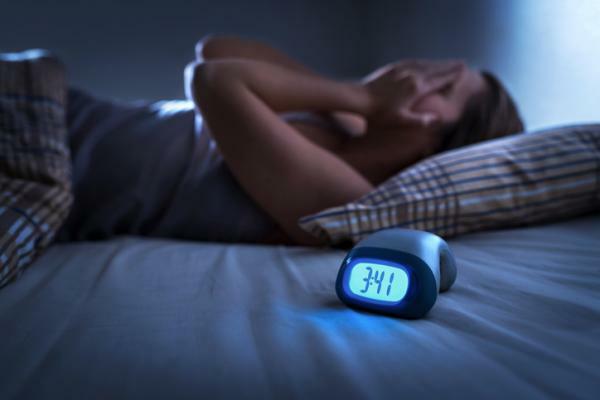
It is quite common to have different problems sleeping. Sometimes these problems consist of not being able to fall asleep, or waking up in the middle of the night several times, waking up very early without being able to fall asleep again, or sleeping too many hours.
Lack of sleep also creates a lot of stress, makes it difficult to concentrate, causes you to perform less at work, makes you irritable and can even increase your appetite. That is why it is so important to look for the causes that cause us not to have a good rest in order to see what we can do.
Next in Psychology-Online we will see why despite being sleepy you can't sleep or it takes a long time to get it and what to do to sleep fast and have a quality sleep.
Index
- Why am I sleepy but can't sleep?
- Causes of insomnia
- How to sleep faster
- Things to do when you can't sleep
Why am I sleepy but can't sleep?
If you try to sleep but can't, and you're tired but can't get to sleep, you may have
- Difficulty initiating sleep
- Difficulty staying asleep
- Wake up early in the morning
This must occur at least 3 nights a week and must affect the work, social or family environment so that the diagnosis can be fulfilled. These sleeping problems last for at least three months and, moreover, occur even when the environment and the room are favorable for sleep.
Causes of insomnia.
Why do I want to sleep and I can't? There are various causes for you to suffer from insomnia or so that, without meeting the requirements, some night you have a poor quality or quantity of sleep. Below we will expose some of the causes so that you can reflect on whether any of them would fit you. In this way, it will be easier to know how to act. The reasons why you cannot sleep even though you are sleepy may be these:
- Excessive consumption of caffeine: one of the most common. Caffeine is a stimulator so it does not allow the body to relax to rest.
- Naps too long that prevent you from being sleepy at night.
- Use of screens before sleep. It has been shown that watching television in bed or on a mobile stimulates the brain, which is why it has an effect similar to caffeine at bedtime.
- Do physical exercise shortly before bedtime. The problem is the same: stimulate the body before sleeping.
- Heavy dinners that cause the body to overwork when it should be resting.
- Thought. Thinking about situations that worry us or that motivate us too much or think about not being able to sleep.
In addition, there may be some organic cause, however, we have decided to focus on those that can be solved from our home. In this article we talk more about the subject and respond to why don't you jerk off to sleep at night.
How to sleep faster.
How to sleep if you can't? You may have heard of the sleep hygiene. This includes a series of habits to acquire to improve the quality and quantity of sleep. The most important sleep hygiene guidelines are:
- Reduction or elimination of caffeine consumption
- Reduction or elimination of naps
- Dine early and light
- Avoid physical exercise late in the day
- Avoid technologies an hour before bed
In a way, these may seem like pretty logical habits, yet many times we insist on look for other reasons why we are not sleeping instead of trying the simplest First.
Things to do when you can't sleep.
Another reason for not sleeping, as we already mentioned, is to be "turning our heads", either because we are thinking about something that worries us, because we are thinking that each time we have fewer hours to sleep because we have to get up early or because we are planning the next day before to sleep.
This supposes a high stimulation at the brain level and prepares all our alert systems in the body. For this reason, our body and mind do not want to allow us to sleep since they want to be prepared to react to what we are thinking. The solution would therefore be stop thinking about what activates us, but how to do it?
There are multiple ways to achieve this, and using one or the other will depend on the person. It is quite common to use relaxation techniques for this, like the one we leave in the following video. These techniques work because they consist of focus attention on a stimulus that does not activate us. Some of them consist of focusing this attention on our breathing and others on our body and concentrating on how it "weighs and weighs" more and more. There are multiple relaxation audios on the internet and mobile applications for this purpose.
Another technique that can be useful in case it is difficult for you to focus your attention on what we have mentioned, is to try to think of something concrete that is pleasant but that do not generate an excitement in you to do it (if you have a certain plan on Friday that makes you very excited, it would not be appropriate since this can also activate your mind). For this we can use Nice memories: on our wedding day, one day we make a plan with friends... or even think of a movie. The idea is that it is not an unpleasant or expectant thought.
Try using these techniques and write in the comments if they have worked for you and if you use any other that we have not discussed here. Together we can help each other sleep better.
This article is merely informative, in Psychology-Online we do not have the power to make a diagnosis or recommend a treatment. We invite you to go to a psychologist to treat your particular case.
If you want to read more articles similar to I'm sleepy but I can't sleep, why and what to do?, we recommend that you enter our category of Clinical psychology.
Bibliography
- American Psychiatric Association (2014). Diagnostic and Statistical Manual of Mental Disorders (DSM-5). Madrid: Editorial Médica Panamericana. ISBN 978-8-4983-5810-0.


